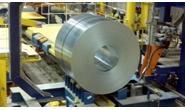Market Segment

April 30, 2014
Olympic Positioned for Promising Q2
Written by Sandy Williams
Higher volumes increased Olympic Steel net sales 2.6 percent to $347 million in Q1 2014 from $338 million a year ago. Net sales increased sequentially by 19 percent despite adverse shipping conditions. Net income totaled $2.8 million, down from 5.16 million in 2013
Flat steel volume increased 3 percent y/y to 299,000 tons for the quarter for net sales of $287 million. Tubular product shipments increased but sales fell by a little more than $1 million to $61 million due to lower average prices.
Steel prices were under pressure during first quarter, falling in mid January and continuing for the next 60 days. Prices rebounded for carbon steel, nickel and stainless steel by the end of the quarter.
During the conference call, Chairman and CEO Michael Siegal said order books are picking up going into the second quarter but it was too early to comment on Q2 based on April. He said Olympic Steel is seeing double digit growth from March.
David Wolfort, president and COO, commented that, “prices have recovered the entire first quarter dip, and now offers are currently being made at the highest levels of the year. Channels remain tight with reasonable to lean service center inventories as a result well publicized supply side disruptions, further supporting higher market prices.” He added, “The set up for the next few months looks promising. We are well positioned with inventory and available capacity through our facility network and a healthy pricing environment.”
Weather issues impacted revenue from multiple-day site closures and increased transportation costs. Occupancy costs included $300,000 of incremental costs associated with heat and building maintenance and snow coverage.
Siegal said the company’s growth strategy is focused on value added opportunities that mitigate distribution costs.







